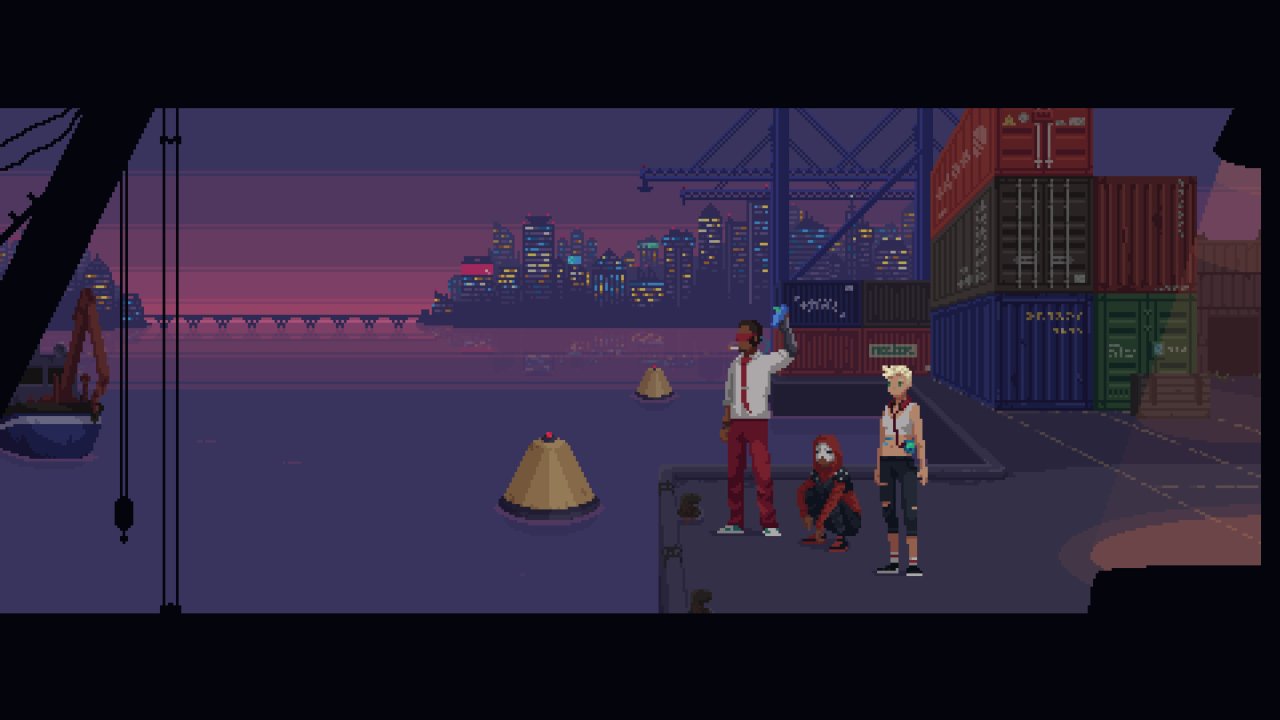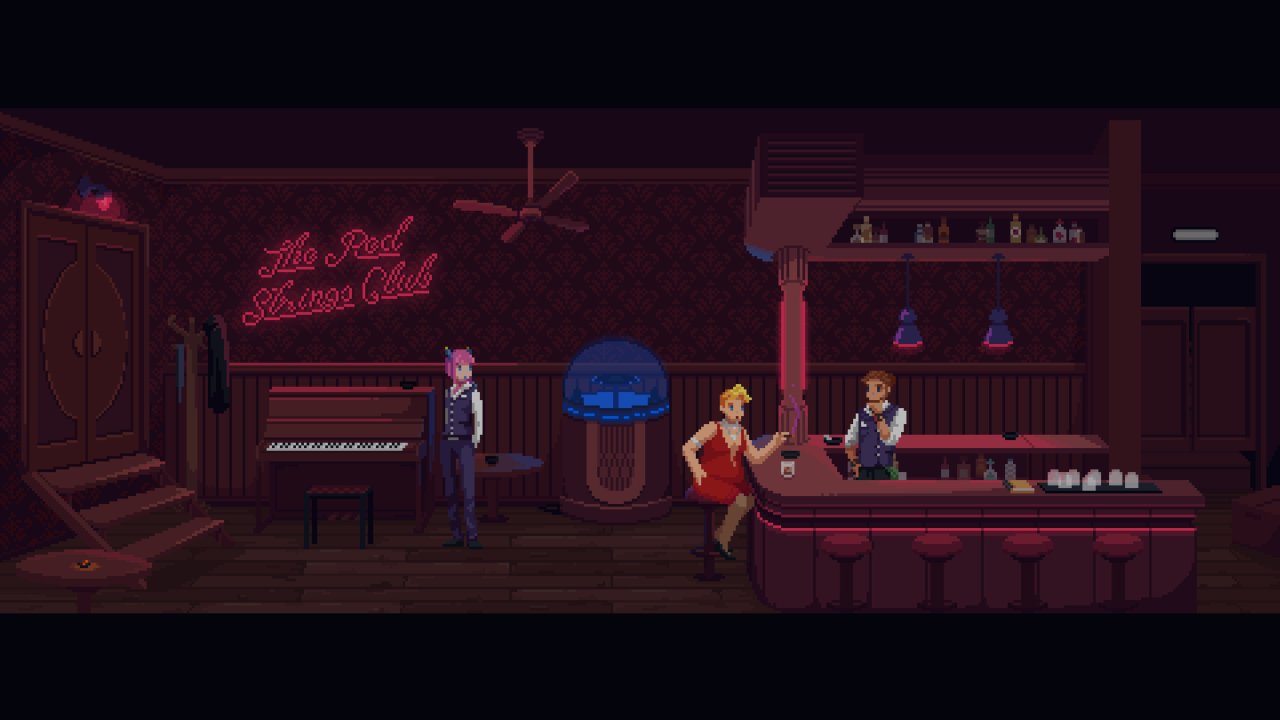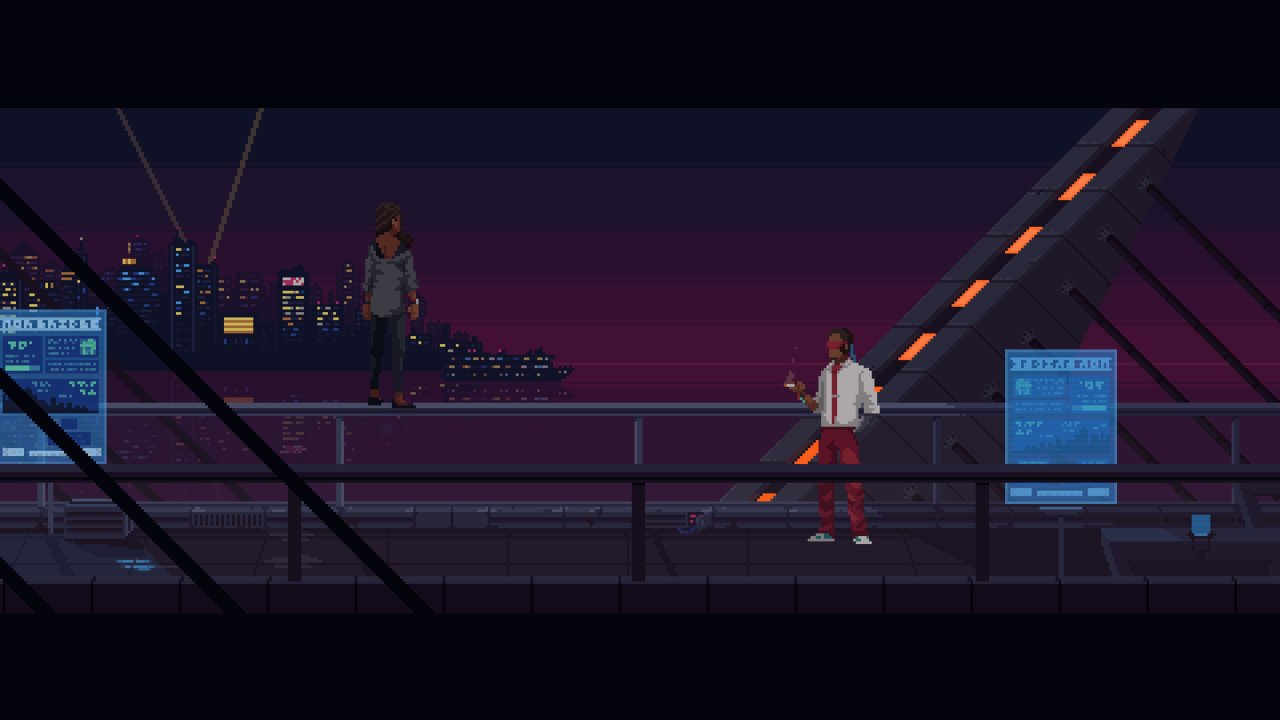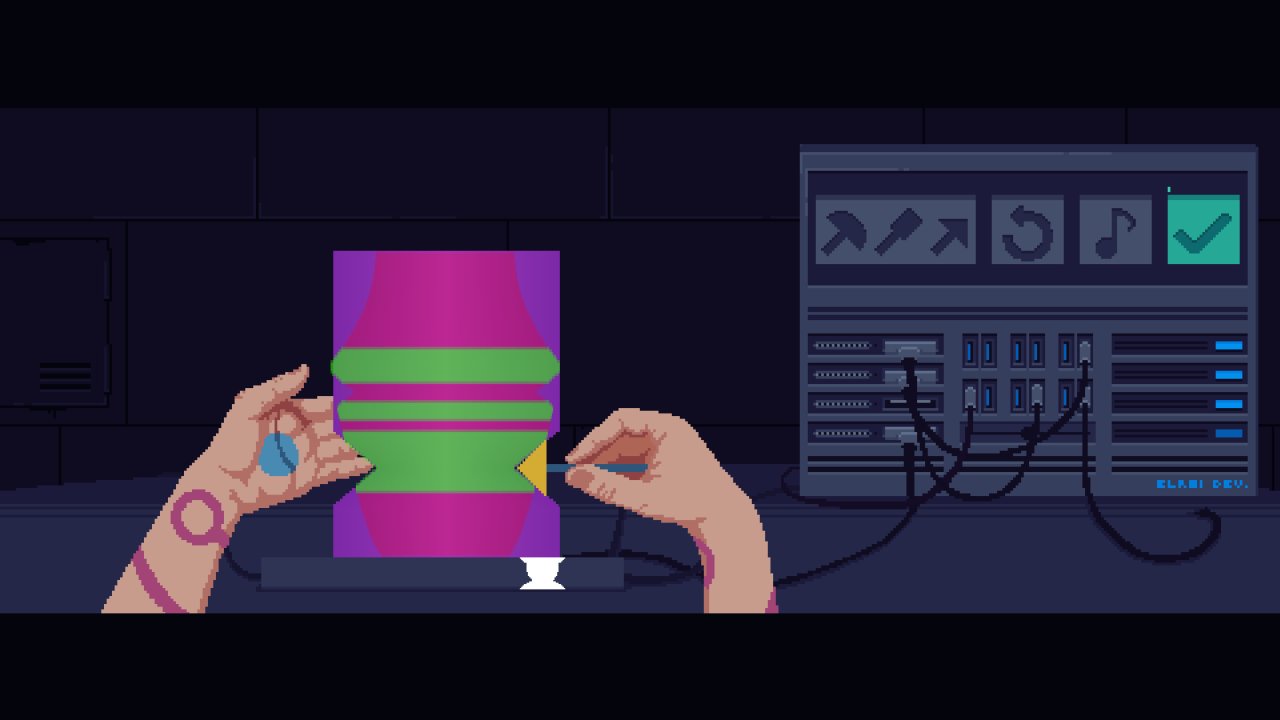The Red Strings Club Review
Grabs important threads and pulls, pulls, pulls
Every day, at around lunchtime, I have an important ritual. I reach into the detritus on my desk, extract a blister pack, press out three pills—small, diamond-shaped, slightly powdery if you hold them too long—and swallow them with a glass of water. They’re antidepressants, of course. It took me a long time to accept that I needed them, and even longer to get over the myriad questions that left me uneasy about having my psyche kept in line by a drug. Is it giving up, to prop up your emotional state with such a crutch? Are your feelings still your own? What if you have a perfectly good reason to be depressed, what good is it to shut out reality? What kind of dependent relationship are you entering into with the pharmaceutical industry, considering that you literally cannot just stop taking these? Unless you want to sleep for sixteen hours a day and wake up with a head full of molten slag, that is.

So maybe I’m a bit biased, then, when a game like The Red Strings Club comes swinging out of the gate with dilemmas on the future of happiness. Once again, we are placed on the brink of a transhumanist future—not so close as to seem mundane, not so distant as to seem improbable—viewed through the eyes of a small cast of characters, set against a background of dusky purple skies and polished wooden bartops. You spend most of the experience in the shoes of Donovan: information dealer, professional answer coax-out-er, and solitary bartender of the reclusive Red Strings Club. Tying these occupations together is your anomalous, mystic ability to influence people’s emotional states with specially-crafted cocktails—to a more specific degree than ‘happy drunk’ and ‘melancholic drunk’, I mean—making your business popular among a certain sort of clientele and, on occasion, extremely good at cajoling juicy tidbits from them. But you’re not the only person tinkering with your customers’ thoughts; a mysterious megacorporation, elbow-deep in implant technology, has developed a way to completely eliminate negative feelings in its users. Only after one of their prototype androids inexplicably shows up on your doorstep, full of more holes than a double-sided floppy disk, do you discover, chillingly, that they plan to roll it out to the rest of the population—whether people want it or not.
What follows is a game of options. Though The Red Strings Club likes to wear garb cut from the same cloth as a point-and-click adventure, you’re largely in for a narrative experience that steams along happily by itself, occasionally asking you to make the call on which set of tracks it should be sent rattling off down next. There’s no effort made to obfuscate these forks in the road—indeed, the game is kind enough to clearly track your path, so you can see where you made all those nasty, hypocritical statements—but they take a number of disparate forms, from simple dialogue trees to minigame outcomes to the drinks you serve your patrons.
But oof, even when the game’s just quizzing you on your ethics, choosing the way forward is no mean feat. Unless you have the moral compass of a runaway pyroclastic cloud, you’re bound to end up grimacing at a few of The Red Strings Club’s dilemmas, which—shockingly, for a cyberpunk game, I know—actually feel relevant to contemporary struggles. I had to play this game in short bursts because having my standpoints constantly prodded and tweaked was downright exhausting. Do you have a right to the technology in your hands? What about in your body? In your bloodstream? How ubiquitous does it have to be to change ownership? And then you run into the mood regulation thing, which—despite my endless dithering over a handful of pills—I was no more prepared for. Do we lose a critical part of ourselves, if we lock depression away forever? What’s the right amount of sadness to experience, then? Who, or what, even has the authority to decide that?

Well, Donovan does, apparently. Like most of the game’s more interactive portions, mixing your mood-altering drinks feels subtly satisfying, even relaxing. Emotional states are represented with little abstract circles suspended in the air in front of you—maybe it’s an augmented reality thing, I don’t know—and your job is to steer your own circle into them, with different kinds of booze nudging the circle in different directions when added to the mix. It’s a very transparent sort of system, to say nothing of risk-free—you can dump your mixture down the sink and start over as many times as you like—but there’s still that warm glow of professional smugness when you pour out a perfect misery martini without spilling a drop.
No, the real challenge is in social engineering; figuring out how to combine your silver tongue with your brews to get information out of whoever occupies the sole bar stool in front of you. What do you know about this person? What state should they be in before you ask a particular question? In contrast to drink-mixing, this aspect of The Red Strings Club is unyieldingly opaque—understandable, since underneath the surface it’s probably just a handful of event flags—but the writing that swathes it is so compelling that it’s hard not to feel engaged. People are hard to read, but not impossible, and the clues the game gives you feel legitimately subtle, instead of the usual patronising wink-wink nudge-nudge eyebrow waggles we’ve grown to expect whenever asked to outsmart a dialogue tree. Sometimes it feels as if the game crosses over into the unreasonably unfair on this front, especially during the little reading comprehension quizzes that are supposed to make sure you’re still following along, but I suppose you can get away with a little tough treatment when failure is a minor inconvenience at most. The only reward I definitely missed out on was a special psychoactive pill which would have let me take a second crack at a given conversation, and yeah, that would’ve been nice, but it’s not critical, you know?
Not everything in The Red Strings Club is quite so easy to swallow, though. For a game with a lot of serious philosophical questions and careful handling of grim subjects, there are times when its writing comes off as decidedly blunt, outlandish, or just grasping at contemporary references for no particularly good reason. Here and there are heavy dashes of the supernatural, like a mysterious black-market dealer whose anomalous powers go unexplained or a major character who is revealed to have the power to defy fate, and the game really doesn’t do a whole lot to justify them, considering how out of place they feel. There’s a bit where a trans character gets deadnamed—ugh, alright, bad things happen to people sometimes—but the reason you dig up the information is because a guy with a crush on her used it as his password recovery answer, which seems breathtakingly misguided. One of the first lines in the script is one character telling another that “we live in a city ruled by corporations”, which not only sounds resoundingly redundant as a statement between colleagues—what kind of rock has he been hiding under?—but also comes off as needlessly heavy-handed exposition for the benefit of the player. I know it’s the cyberpunk future, man. You’ve already showed me neon signs, glimmering skyscrapers, and a man with enough circuits in his head to pose a hazard to commercial avionic systems.

Then there’s the bit where you’re a medical android. Not just any medical android: one of a line of prototypes capable of making ethical decisions. Which means, erm, you’re in charge of selecting, crafting and surgically installing implants that can radically change people’s psyche, based on a brief printout of their current grievances. Constructing implants is, once again, a risk-free and mildly satisfying task—you’re essentially just making pottery out of futuristic bio-goo—but the process as a whole feels inherently unethical, not to mention constrictive. You have a narrow range of implant options, you can’t discuss your planned solution with your patients before you slice them open—which seems kind of extreme given that they came in with complaints like “I need to get better at pitching to investors” or “I wish I wasn’t a terrible Twitter rando”—and to the surprise of absolutely nobody, most of them come back with completely different complaints fuelled by your tampering. It’s hard to feel like you’re being confronted with challenging ethical dilemmas when they’re predicated entirely on you being locked in a room and forced to perform medical malpractice. Worse still, patients just keep coming back again and again until you install the implant that the game deems to be the ‘right’ solution, so actually it doesn’t matter what you think! The message to take away is that actually this is all fine, I guess, as long as you cram the proper wetware into your unconscious client’s abdomen.
Tsh, it’s always the same, ain’t it? The better a narrative experience is, the more nitpicking opportunities you find. And make no mistake, The Red Strings Club is a strong narrative experience, though a good deal more accessible than the words ‘strong narrative experience’ might suggest. As time went on, I grew to appreciate how it felt reminiscent of a small but professional stage production; the kind that leaves the bustle of the West End far behind and ushers you through low-ceilinged subterranean corridors into a cramped, dim theatre, where every seat feels personally privy to the action. The Red Strings Club itself becomes a persistent backdrop around which nearly everything revolves; sparsely but smartly decorated, barely changing throughout the story. Almost every scene has a maximum of two or three characters on-screen at once, and nobody ever enters or leaves through any means other than the entrance on the far left of the screen, disappearing into the unknown, unseen metropolis that lurks somewhere on the other side of the front door. Action and special effects are rare and frequently understated, and storytelling techniques that don’t involve a handful of characters just talking to one another are few and far between, barring the occasional dramatic (and very effective, mind) jump-cut. Whether such limitations are intentional or just coincidental is unclear—mostly they can be explained with ‘game development is bloody expensive, mmkay?’—but they make the narrative focused, controlled, and remarkably easy to digest. It feels as if a lot of story-driven games these days tend to resemble exhausting visual novels or incomprehensible indie cinema with an ‘interact’ button, but The Red Strings Club’s relative restraint—and its understanding that telling is actually sometimes quicker than showing—demonstrates a sensible alternative.

When it comes to branching narratives, it’s tempting to rate your experience based on how eager you are to run around and go right back in from the beginning, like an excitable child at the waterslides. You’re supposed to wonder “what if I’d done things differently?” and resolve to start over with a completely contrarian attitude. With The Red Strings Club, I feel at peace with my outcome, and would rather remember it the way I do now: not perfect, not nearly flawless, but ultimately satisfying. We can’t be happy all the time, no matter how much technology props us up, but with The Red Strings Club, at least for a while, I was. And you can’t ask for more than that, can you?
 Comments
Comments












